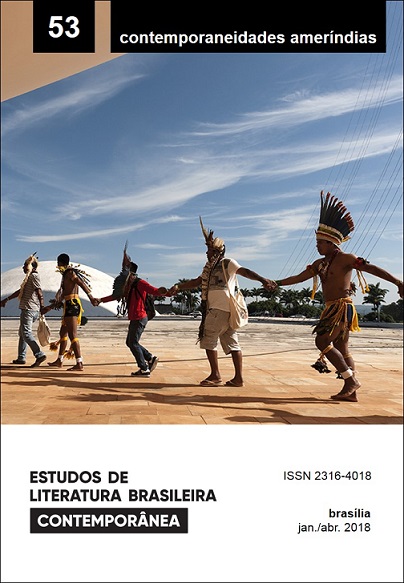Taren, eren and panton:
Macuxi oral poethnicity
DOI:
https://doi.org/10.1590/2316-4018534Abstract
Taren, eren and panton are terms from the Macuxi language that mean, respectively, enchanted word, song and narrative. Macuxi are Carib indians who designate themselves as Pemon (people). They live in the Circum-Roraima region, on the triple border among Brazil-Venezuela-Cooperative Republic of Guyana. This work proposes these three Macuxi terms as an expression of an oral poetics of this indigenous people, who are troubled by the disregard towards Brazilian oral poetics.
References
AGUIAR E SILVA, Vítor Manuel (2000). Teoria da literatura. Coimbra: Almedina.
ALBERTI, Verena (2004). Manual de história oral. 2. ed. Rio de Janeiro: Editora FGV.
ARMELLADA, Cesáreo de; NAPOLITANO, Carmela Bentivenga de (1975). Literaturas indígenas venezolanas. Caracas: Monte Ávila.
ARMELLADA, Cesareo de; SALAZAR, Mariano Gutierrez (2007). Diccionario pemón: pemón-castellano/castellano-pemón. Caracas: Universidad Católica Andrés Bello; Hermanos Capuchinos.
BENJAMIN, Walter (1987). O narrador. Considerações sobre a obra de Nicolai Leskov. In: BENJAMIN, Walter. Magia e técnica, arte e política: ensaios sobre literatura e história da cultura. 3. ed. São Paulo: Brasiliense.
BUTT-COLSON, Audrey Butt (1985). Routes of knowledge: an aspect of regional integration in the circum-Roraima area of the Guiana Highlands. Antropológica, Caracas, n. 63-64, p. 103-149. Disponível em: <https://goo.gl/2QkQT2>. Acesso em: 15 jan. 2017.
CAMPOS, Haroldo (2011). Da transcriação: poética e semiótica da operação tradutória. Belo Horizonte: Viva a voz (FALE/UFMG).
CASTRO, Eduardo Viveiros de (2011). A inconstância da alma selvagem. São Paulo: Cosac Naify.
COMPAGNON, Antoine (2012). O demônio da teoria: literatura e senso comum. 2. ed. Belo Horizonte: Editora da UFMG.
EAGLETON, Terry (1997). Teoria da literatura: uma introdução. 3. ed. São Paulo: Martins Fontes.
GONZÁLEZ, Mauricio Ostria (2001). Literatura oral, oralidad ficticia. Estudios Filológicos, Valdivia, n. 36, p. 71-80. Disponível em: <https://goo.gl/wBKaKX>. Acesso em: 15 jan. 2017.
GOLDEMBERG, Deborah (2009). A concepção do I Sarau de Poéticas Indígenas por uma antropóloga escritora. Espaço Ameríndio, Porto Alegre, v. 3, n. 1, p. 42-60, jan./jun.
HAVELOCK, Eric A. (1996). A musa aprende a escrever. Lisboa: Gradiva.
KOCH-GRÜNBERG, Theodor (2006). Do Roraima ao Orinoco: observações de uma viagem pelo norte do Brasil e pela Venezuela durante os anos de 1911 a 1913. Tradução de Cristina Alberts-Franco. São Paulo: Editora da Unesp. v. 1.
OLIVEIRA, Idelvânia Rodrigues de (2014). Os Monaikó: narrativas orais e registros linguísticos. Dissertação (Mestrado em Letras) ”“ Universidade Federal de Roraima, Boa Vista.
ONG, Walter J. (2002). Orality and literacy. New York: Routledge.
RABELO FILHO, Manoel Gomes; ARAÚJO Jacilda Barreto de (2015). A representação social do kanaimî, o piya’san e do tarenpokon. Olhares Amazônicos, Boa Vista, v. 3, n. 2, p. 627-637, jul./dez.
RISÉRIO, Antonio (1993). Textos e tribos: poéticas extraocidentais nos trópicos brasileiros. Rio de Janeiro: Imago.
SEBILLOT, Paul (1881). Littérature orale de la Haute Bretagne. Paris: Maisonneuve; Cia Éditeurs.
THURN, Everard F. im (1883). Among the indians of Guiana. London: Kegan.
WITEHEAD, Neil L. (2002). Dark shamans: Kanaimà and the poetics of violent death. Durham & London: Duke University Press.
ZUMTHOR, Paul (1993). A letra e a voz: a literatura medieval. Tradução de Amálio Pinheiro e Jussara Pires Ferreira. São Paulo: Companhia das Letras.
Downloads
Published
Issue
Section
License
Authors who publish in this journal agree to the following terms:
a) The authors maintain the copyright and grant the journal the right of first publication, the work being simultaneously licensed under the Creative Commons Attribution License-Non Commercial 4.0 which allows the sharing of the work with acknowledgment of the authorship of the work and publication this journal.
b) Authors are authorized to enter into additional contracts separately, for non-exclusive distribution of the version of the work published in this journal (eg publish in institutional repository or as a book chapter), with authorship recognition and publication in this journal.
c) Authors are allowed and encouraged to publish and distribute their work online (eg in institutional repositories or on their personal page) after the editorial process, as this can generate productive changes, as well as increase the impact and citation of published work (See The Effect of Free Access).
d) The authors of the approved works authorize the magazine to, after publication, transfer its content for reproduction in content crawlers, virtual libraries and the like.
e) The authors assume that the texts submitted to the publication are of their original creation, being fully responsible for their content in the event of possible opposition by third parties.


